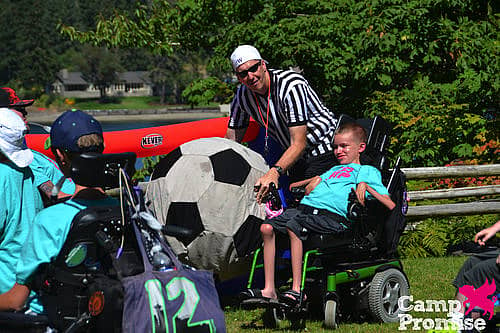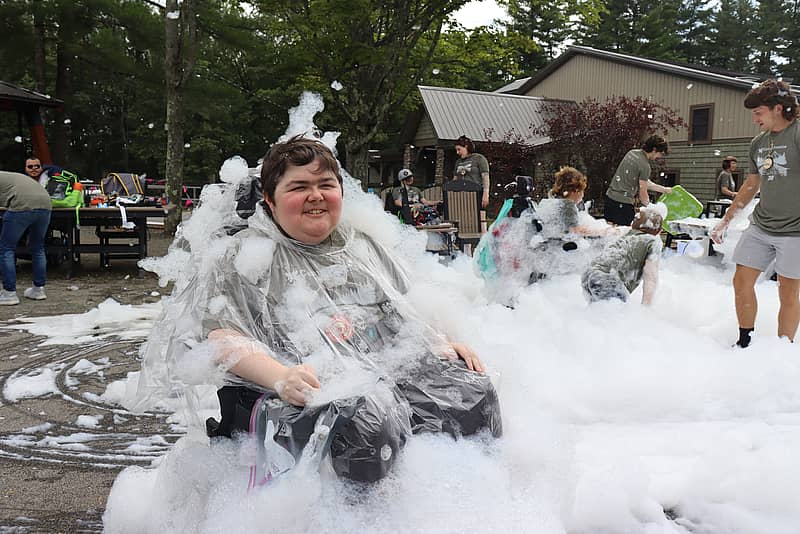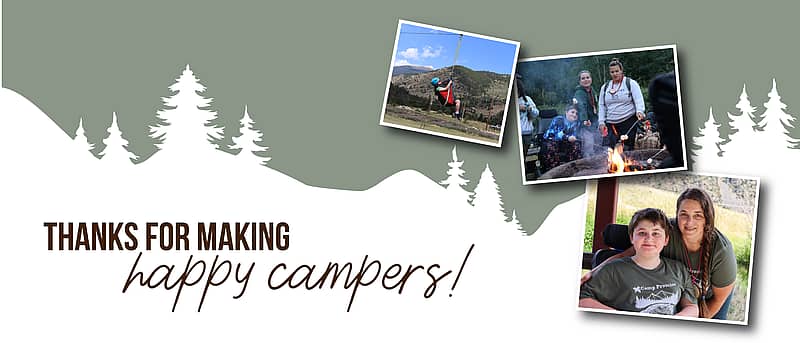In our previous post we shared some tips on when and how to ask for time off from work to volunteer at camp. However, we know a lot of our camp staff are graduating from college or finishing up a graduate degree and may not even have a job yet from which to ask for time off.
If you’re just finishing school and are in the process of applying for a new job, or maybe even your first job ever, we get it. Applying for a new job is stressful enough. And, your first job out of college is a BIG deal. You definitely want to put your best foot forward and be professional (even if the truth is that your heart is tugging you towards a week of costumes at camp!).
So, if we ask you if you’re coming to camp and you find yourself saying “I can’t commit right now because I don’t know where I’ll be working this summer” or “I’m in the process of applying for jobs and am not sure if I will be able to get time off,” then this Part 2 post is for you!
Do I Have Time For Camp?
Feel like your job search needs to be your priority? Are you concerned about using your job search time to go to camp? Feel like you’ll lose a week of traction if you go to camp? Well, we’re here to tell you that you can do both!
Don’t worry, camp won’t be a distraction. In fact, going to camp during your job search can be a good thing. For one, it will show future employers that you’re productive with your time and aren’t just sitting at home during your job search. And two, it will give you additional experience to add to your resume and speak of during your interviews. Plus, it might serve as a reset button by giving you a break from the stress of applying for job and interviewing. By the time you get back from camp, you’ll be refocused and ready to charge forward with your job search.
But, they’ll never hire me if they know about camp!
For those of you who are at the point in your search that you think you’ll land a job right before camp, our veterans have some advice for you. We talked to four current staff and they all agreed that this is a great spot to be in. In fact, they all suggested mentioning camp during your interview and then officially asking for the time off after you get an offer and are in the negotiation phase.
Abby, one of our Unit Leaders at Camp Promise-East and Camp Promise-West who has been coming to camp for 4+ years, shared the following:
“I didn’t ask for the time off during my interview, but I certainly laid the groundwork for it. I made sure they knew about camp by mentioning it in during my interview as something very important to me, and I talked about how camp has impacted me not just personally, but professionally, too. Then, once they were excited about me and I got the offer, I told them about my commitment to camp and asked for the time off during the negotiation phase. It wasn’t something that was coming from left field for them, they’d already heard about it during my interview. It’s never good to surprise an employer.”
Carla from our Logistics Team at Camp Promise-West agrees. “When interviewing, set the expectation up front with the employer. You don’t have to ask for it in the interview, but can wait until they offer you the job. But, for sure mention it before you accept.”
Not sure how to actually phrase your ask? After you receive your offer, try something like this:
“I’m so excited about this job, but I also want to be upfront about the camp I mentioned in my interview that is so important to me. The dates are [XXX]. I know it’s only a few weeks after I start working here, but I’d like to attend as this is something I’ve committed to a while ago and I don’t want to leave the camp nor the campers in a tough position. I am confident camp will only make me a better employee and I would like to work with you to develop a plan so that I do not fall behind in my work and am still able to keep my commitment to the campers.”
When it comes to bringing up camp during your job search, the number one fear that job applicants tell us they’re worried about is that asking for time off to go to camp so soon will cause their offer to be rescinded. But, from our experience, we don’t believe this will be the case.
If you mentioned camp during your interview, it’s probably one of the reasons they really liked you (because what’s not to like about camp?!). And, if you phrase it as a commitment you made that you want to keep, then your new employer is likely to see you as someone who keeps their word and makes good on their commitments. This quality is attractive to employers and may even serve to bolster their reasons for selecting you for the position.
“I have found that every employer I’ve worked for is willing to honor time off that I’ve brought up when I was first hired,” said Aaron, a three-year veteran counselor at Camp Promise-Rockies.
Keep in mind, too, that, the hiring process can be time consuming for both applicants and employers. Asking during the negotiation phase for a week off to volunteer is likely not a good enough reason for an employer to go back to the drawing board to look for a new candidate.
Plus, you’re not asking for time off to take a vacation, you’re taking time to volunteer. It’s different and your employer will recognize this, too. Don’t feel guilty for taking time off so soon and just focus on the positive aspects of your commitment as a volunteer. [For more thoughts on this, make sure to read Making Camp a Priority, Part 1: How to Get Time Off For Camp This Summer.]
More Tips
If you didn’t catch our previous post, here’s a summary of 10 tried-and-true tips from the experts on how and when to ask for the time off from work:

- Ask early. Be sure to give your boss as much of a heads up as possible.
- Specify that you’ll be volunteering, not just going on vacation.
- Keep things positive. Focus on how wonderful an opportunity camp is and why it is so important to you.
- Be accommodating. Offer alternative times and dates to get your work done to make your absence easier for your boss and team.
- Swap shifts. If your workforce uses a shift schedule, try to ask before the schedule is set. And, if you can’t, ask around to see if anyone will swap shifts with you to limit the amount of vacation time you may need to use.
- Relate it to your job. Don’t be afraid to tie volunteerism to your company’s values so everyone can see how this is a win-win for both you and your organization.
- Professional development. We believe the work our volunteers do make them better people and better employees. So, make sure to mention how volunteering at camp can be an opportunity for professional development.
- Ask your HR department whether your company has a volunteer benefit program so that you can use comp time, flex time, or volunteer PTO hours for camp.
- Use your Paid Time Off (PTO)/vacation time. PTO can be used for just about anything and if you request it in advance, employers typically don’t object.
- Talk about camp! When you get back, make sure to share the outcome of your volunteering experience with your supervisor and coworkers so that you build excitement from the employer side as well.
We know it can be hard to commit to camp when you don’t know where you’ll be working and if you’ll be able to get the time off so soon after starting a new job. But, we know it’s possible and believe you can make it happen. We’ve seen others do it and know you can, too. So, with that…see you at camp next summer! #noexcuses
For more details, see Making Camp a Priority, Part 1: How to Get Time Off For Camp This Summer.
Many thanks to Carla, Abby, Trisha, Aaron, Caroline and Vuyani for their help with this series!
–Post by Libby Brockman






